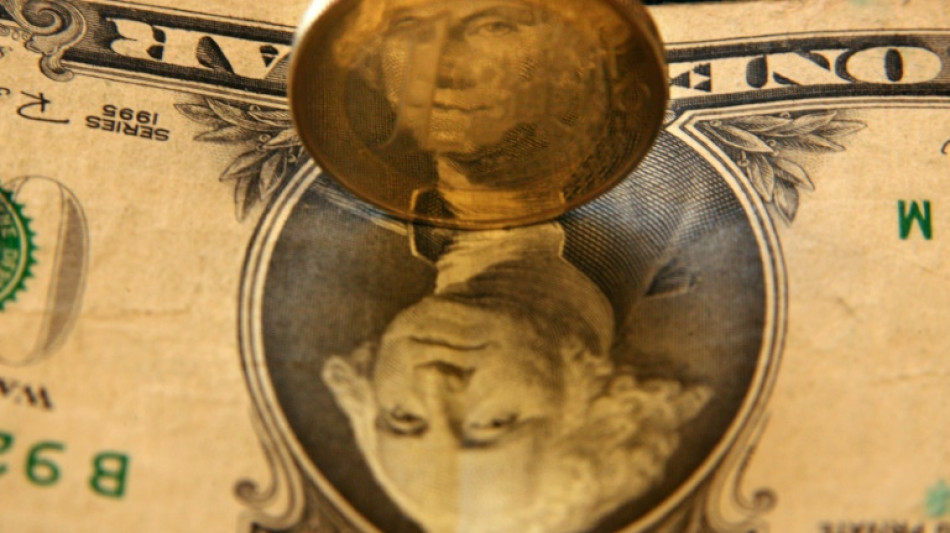

Euro drops to dollar parity as eurozone recession fears mount
The euro struck parity with the dollar for the first time in nearly 20 years on Tuesday as a cut in Russian gas supplies to Europe heightened fears of a recession in the eurozone.
The European single currency hit exactly one dollar -- its lowest level since December 2002 -- before bouncing back to as high as $1.0070.
Oil prices plunged on concerns of a wider recession as central banks hike interest rates to fight decades-high inflation, with both main contracts falling back under $100 per barrel at one point.
While European stocks initially moved lower, they rallied in afternoon trading to finish higher. Wall Street's main stock indices were also up in late morning trading.
"Rising inflation, stalling economic growth and more recently fears that Russia could cut gas supplies have pulled the euro lower," said Fiona Cincotta at City Index.
"The nail in the coffin today was dire data showing that economic confidence in Germany fell to a decade low," she added.
Russian energy giant Gazprom on Monday began 10 days of maintenance on its Nord Stream 1 pipeline -- with Germany and other European countries watching anxiously to see if the gas comes back on.
"The gas crisis has really spooked markets over the eurozone economy," Markets.com analyst Neil Wilson told AFP.
With relations between Russia and the West at their lowest in years because of the invasion of Ukraine, Gazprom may not reopen the valves, according to analysts.
"The next few weeks could be challenging for Europe, with possibly maximum uncertainty stretching into August," said SPI Asset Management's Stephen Innes.
"Investors increasingly believe that gas may not start to flow through Nord Stream 1 again following the scheduled maintenance on July 11-21, with further 'temporary' interruptions seen as likely."
Worries about a Covid flare-up in China -- fuelling fears of more lockdowns -- added to the downbeat mood, just as investors prepared for a week of economic data and corporate earnings that could have huge implications for markets.
A forecast-beating US jobs report last week suggested the world's top economy was coping with higher Federal Reserve rates, but it also gave the central bank more room to continue tightening -- leading to concerns it could go too far and cause a contraction.
The European single currency is also under pressure from the Federal Reserve hiking US interest rates more aggressively than the European Central Bank.
The dollar has jumped 14 percent against the euro since the start of the year.
US inflation data due out Wednesday could also solidify the case for the Fed to continue raising interest rates aggressively.
"In anticipation of that, investors have retreated to the safety of the US dollar once more, steering clear of risky assets in favour of haven" assets, said market analyst Craig Erlam at trading platform OANDA.
Central banks have been increasing borrowing costs in a bid to tame inflation, which has been fuelled by soaring energy prices.
Oil and gas prices have rocketed this year after economies reopened from Covid lockdowns and following the invasion of Ukraine by major energy producer Russia, which raised concerns whether supplies will be adequate.
- Key figures at around 1530 GMT -
Euro/dollar: UP at $1.0065 from $1.0041 Monday
Pound/dollar: UP at $1.1911 from $1.1892
Euro/pound: UP at 84.57 pence from 84.38 pence
Dollar/yen: DOWN at 136.66 yen from 137.41 yen
West Texas Intermediate: DOWN 6.8 percent at $96.99 per barrel
Brent North Sea crude: DOWN 6.3 percent at $100.41 per barrel
New York - Dow: UP 0.5 percent at 31,318.22 points
EURO STOXX 50: UP 0.4 percent at 3,487.05
London - FTSE 100: UP 0.2 percent at 7,209.86 (close)
Frankfurt - DAX: UP 0.6 percent at 12,905.48 (close)
Paris - CAC 40: UP 0.8 percent at 6,044.20 (close)
Tokyo - Nikkei 225: DOWN 1.8 percent at 26,336.66 (close)
Hong Kong - Hang Seng Index: DOWN 1.3 percent at 20,844.74 (close)
Shanghai - Composite: DOWN 1.0 percent at 3,281.47 (close)
burs-rl/bp
J.Romagnoli--IM




